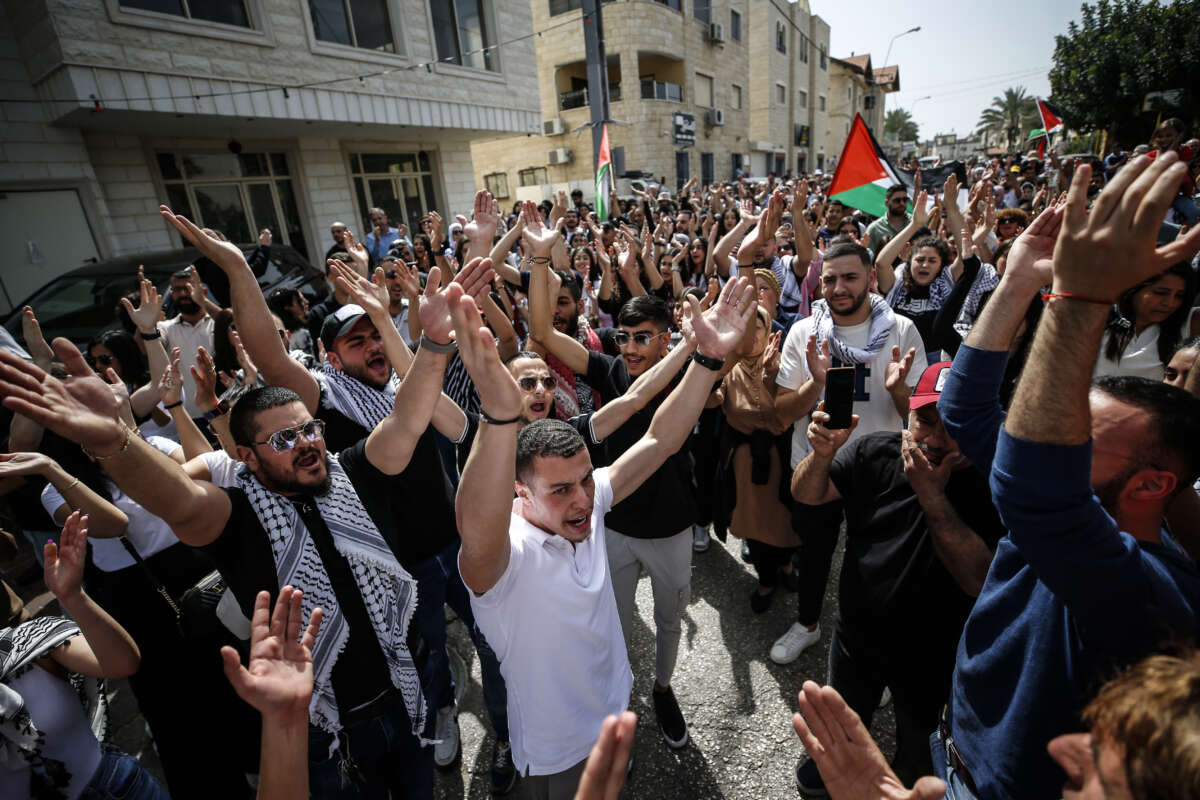Palestinians on Saturday were joined by people across the globe in marking Land Day, the 48th anniversary of Israel’s killing of six unarmed protesters who rose up against the Israeli government’s confiscation and occupation of Palestinian land.
Thousands of Palestinian people marched through Deir Hanna, one of the Israeli towns where authorities violently cracked down on nonviolent protesters on March 30, 1976, as they honored Raja Abu Raya, Khader Khalayleh, Khadija Shawahneh, Kheir Yassin, Mohsin Taha, and Raafat Zuhairi.
More than 100 people were also injured by Israeli authorities during the protest in 1976, which was organized in opposition to Israel’s confiscation of nearly 5,000 acres of land that belonged to Palestinian citizens of Israel in the northern Galilee region.
The Good Shepherd Collective, an anti-Zionist human rights group based in the West Bank, said that with Israel bombarding Gaza and conducting raids almost daily in the West Bank as officials seize more land, Land Day becomes “more relevant” every year.
“No Palestinian needs to be reminded of the centrality of the land in the struggle for justice and liberation. Land Day is more a remembrance of one massacre among hundreds over more than one hundred years of Zionist violence,” said Good Shepherd Collective. “In the midst of a genocide, we must continue to speak out and speak of the context of settler-colonialism’s baked-in logic of elimination.”
Last week, Israeli Finance Minister Bezalel Smotrich announced Israel was seizing nearly 2,000 acres of land in the occupied West Bank, which would allow the country to build more illegal settlements. The country’s settlement-planning authority said earlier this month it had approved the construction of 3,500 new housing units in the territory.
As the Middle East Eye reported, Israeli forces conducted overnight raids across the West Bank ahead of Land Day, killing a 13-year-old boy named Nabil Abu Abed near Jenin.
The U.S.-based Jewish Voice for Peace (JVP) marked Land Day as organizers with the group held solidarity marches and rallies in cities including Boston; Portland, Maine; and Providence, Rhode Island. Other groups organized a march scheduled for Saturday evening in New York City.
The group noted that Land Day also marks the beginning of the Great March of Return protests, which were held weekly for 21 months starting on March 30, 2018 as demonstrators demanded an end to Israel’s blockade of Gaza and the right to return to the homes their families were expelled from in 1948 when Zionist forces cleared the way to establish Israel. More than 200 Palestinians were killed by Israeli forces for participating in the marches, including 46 children.
“We mourn the thousands whom the Israeli military murdered or permanently injured over the years. We honor those who rose up in 1976 and all who have risen up to fight for justice in Palestine,” said JVP.
Marches also took place in Cardiff, Wales; London; Madrid; and Helsingborg, Sweden, with protesters reiterating the demand for an immediate, permanent cease-fire in Gaza.
“I’ll keep [marching] as long as the bombing and the apartheid and the injustice is going on,” Stephen Kapos, an 86-year-old survivor of the Holocaust, told Al Jazeera.
Our most important fundraising appeal of the year
December is the most critical time of year for Truthout, because our nonprofit news is funded almost entirely by individual donations from readers like you. So before you navigate away, we ask that you take just a second to support Truthout with a tax-deductible donation.
This year is a little different. We are up against a far-reaching, wide-scale attack on press freedom coming from the Trump administration. 2025 was a year of frightening censorship, news industry corporate consolidation, and worsening financial conditions for progressive nonprofits across the board.
We can only resist Trump’s agenda by cultivating a strong base of support. The right-wing mediasphere is funded comfortably by billionaire owners and venture capitalist philanthropists. At Truthout, we have you.
We’ve set an ambitious target for our year-end campaign — a goal of $180,000 to keep up our fight against authoritarianism in 2026. Please take a meaningful action in this fight: make a one-time or monthly donation to Truthout before December 31. If you have the means, please dig deep.
